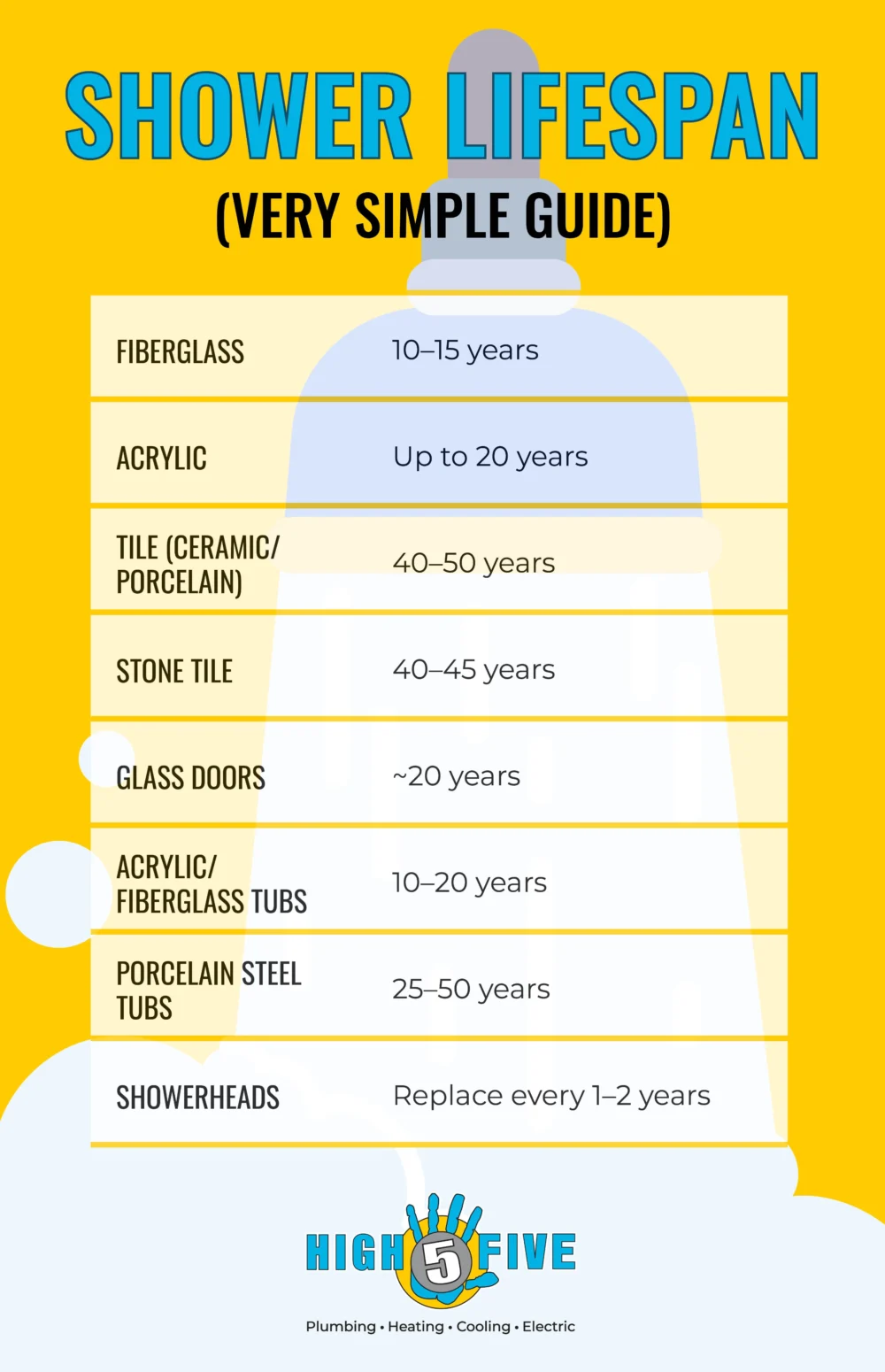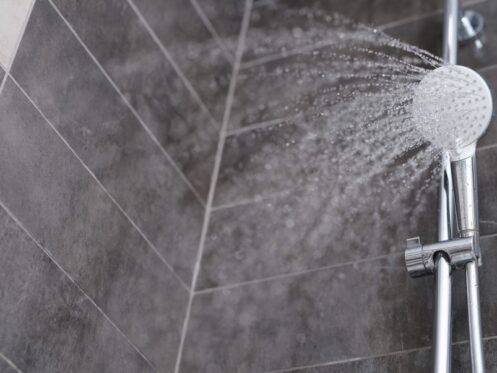Originally Published: November 10, 2022
Your shower is part of your everyday routine, but it won’t last forever. Materials, maintenance, and other factors affect how long a shower lasts and when you’ll need to plan for a replacement. Learn how long you can expect your shower to last before issues like cracks, leaks, and stains become a problem and when to contact a professional plumber to upgrade your shower.
Acrylic and Fiberglass Showers
Acrylic and fiberglass showers are popular due to their affordability and low maintenance requirements. These units are often prefabricated, which makes installation in your bathroom simple and reduces the risk of leaks from seams or joints.
Fiberglass showers are often more budget-friendly than acrylic, but they tend to wear out faster, typically within 10 to 15 years. While you can sometimes patch and seal minor damage, fiberglass showers are prone to hairline cracks and flexing, especially with poor installation.
Acrylic showers feature a glossy protective finish that resists scratches and wear. With proper care and maintenance, this protective layer allows acrylic showers to last up to 20 years.
Ceramic and Porcelain Tiles
Ceramic and porcelain tile showers offer more versatile design opportunities, with a wide variety of sizes, colors, and textures available. Unlike prefabricated units, tiles let you customize your shower’s appearance, making them a popular choice for higher-end remodels.
Tiles are durable and relatively easy to maintain. A cracked tile also doesn’t require replacing the entire unit because individual damaged tiles can often be replaced. With regular care, ceramic or porcelain tile showers can last between 40 and 50 years.
Proper care of grout and pan liners helps tile showers last longer because these materials keep them watertight. Pan liners, which are typically made of waterproof plastic or rubber barriers, usually last around 45 years before developing small cracks or pinholes, making them ineffective against leaks. Grout lines also require resealing every one to two years to prevent moisture from seeping past the tile.
Stone Tiles
Stone tile showers, often built with marble, slate, or travertine, bring a high-end look to bathrooms but require more maintenance than other shower materials. Natural stone tiles are more porous than ceramic or porcelain tiles, absorbing moisture, soap, and minerals more easily. Regular sealing helps minimize absorption, but stone tiles may still develop mold or become discolored as they age.
Well-maintained stone tile showers usually last between 40 and 45 years, or as long as their pan liners remain intact. Without proper care, stone tile showers can deteriorate or stain, requiring premature replacement.
Glass Tiles and Shower Doors
Glass tile showers offer a unique, contemporary look. Like other tiles, glass tiles are applied to a solid backing with grout between the seams, and they can last as long as the underlying pan liners with regular maintenance.
However, glass is fragile and more prone to cracks, scratches, or dullness. They also require more frequent cleaning because they show soap scum and water spots more noticeably than other shower materials. Cleaning requires soft cloths and non-abrasive products. Glass tiles typically need annual resealing and re-grouting every 5 to 10 years to maintain their appearance and performance.
Most glass shower doors can last approximately 20 years. They’re usually made from tempered glass, which provides better durability than tile. Shower door components, such as hinges, rollers, and handles, may wear out more quickly and require replacement after 10 years. As glass doors age and the silicone sealant deteriorates, replacing the sealant can restore the watertight barrier.

Bathtubs
Bathtubs are made from the same materials as showers and share their characteristics and lifespans. Prefabricated acrylic and fiberglass tubs last 10 to 20 years, and combination shower and bathtub units require replacing the entire fixture when either the shower wall or bathtub wears out.
Porcelain-enameled steel tubs tend to last the longest, about 25 to 50 years, but they require replacement once they develop deep cracks or rust.
Shower and Bathtub Fittings
Shower components often wear out faster than the shower itself. Replacing these components is part of regular maintenance.
Showerheads
Hard water minerals and scale often build up inside showerheads, reducing water flow. They eventually accumulate too much buildup to clean and require replacement every one to two years, though higher-quality fixtures can last several more years.
Faucets and valves
Bathtub faucets last 10 to 20 years, depending on quality and usage. Valves regulate flow and temperature, and they typically last as long as the faucet. Worn-out valves may cause water temperature swings or steady drips from the spout.
Shower doors or curtains
Glass doors can last decades, but they’ll need new seals or rollers every 10 years or so. Shower curtains should be replaced annually or whenever they develop mildew or show signs of wear.
How To Know When to Replace Your Shower
Common signs that it’s time to replace your shower include:
- Cracked or stained surfaces
- Persistent mold or mildew
- Reduced water pressure
- Leaks from the unit or door
- Spongy or warped flooring
- Deteriorated caulk or grout
- Outdated design or features
Several factors can cause a shower to wear out more quickly, including hard water, abrasive cleaners, frequent use, lack of maintenance, and improper installation. Choosing high-quality materials and staying on top of care tasks can help extend the life of your shower.
Consider installing a water softener system if you live in an area with hard water, and schedule professional plumbing inspections every few years to catch leaks or worn components early.
Upgrade Your Shower With Professional Plumbing Installation Services
When your shower starts leaking or no longer suits your bathroom, rely on High 5 for professional shower installation and other bathroom plumbing upgrades. We also offer water heater services, repiping, drain cleaning, sewer and water line services, and a range of other plumbing services for homeowners in the Denver Metro area. Contact us today to book a service or learn more about your options.

